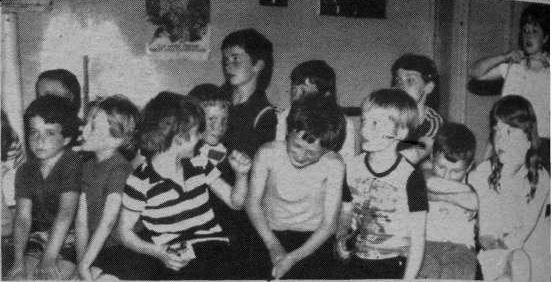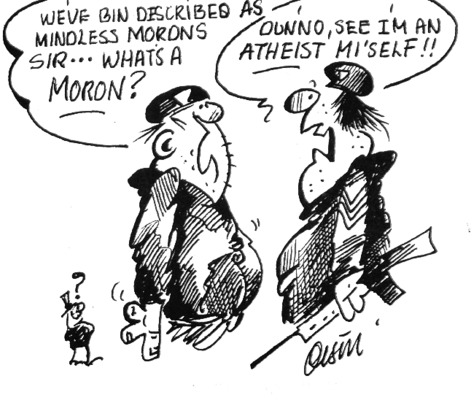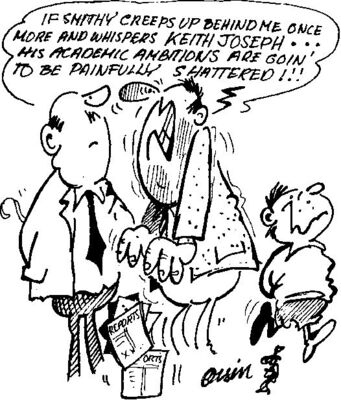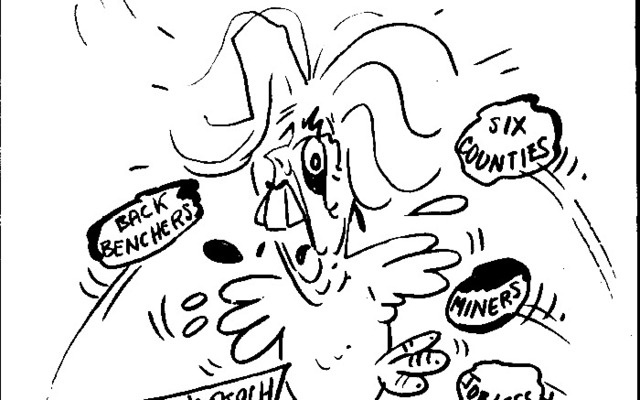We look at the stories that were making the headlines this week in 1983
No plans to review anti-Irish street names legislation
THE British Government's confirmation that it is unequivocally opposed to the erection of Irish translations of street names, has been met with a clamour of protest from Nationalists.
News of the British stance came on 22nd July in an answer by Chris Patten, Minister with responsibility for the Environment, to a question by Plaid Cymru MP Dafydd Wigley. At the request of a Belfast Gaelgoir, Mr Wigley asked Mr Patten if he would "review his policy with regard to permitting the use of the Irish language in street names...where residents wish them to be shown in Irish."
In a brief reply, Mr Patten said he had "no plans" to change the 1949 law which forbade names "to be put up or painted otherwise, than in English." The law introduced by Stormont has not been enforced once during its 34 years on the statute books.
However, a Belfast man was arrested in the St James' area in May while erecting Irish street names and Belfast City Council may yet take legal action against him.
To date, only Twinbrook has become a completely bilingual estate, although in St James', Lower Falls, Ballymurphy, Turf Lodge and parts of Andersonstown, a majority of people have expressed a wish to have their street names, most of which originate from the Irish, Gaelicised.
Condemning the Minister's "intransigence", the Belfast Executive of Conradh na Gaeilge, the country's biggest Irish language organisation, accused him of "prescribing a British way of life for Irish people."
Commented a spokesperson: "British policy in this regard is undemocratic and repressive as it ignores the popular affinity with the Irish language which undoubtably exists in the Six Counties. Conradh na Gaeilge reaffirms its support for the ongoing campaign to erect Irish translations of street names in areas where this is in keeping with the wishes of the local people."
Sinn Féin also lashed out at the British Government, accusing them of "endorsing the sentiments of the Unionist Ascendancy" and thus making "nonsense of their talk about respecting the so-called two traditions here”.
"The British Government has a long and ignoble history of suppressing the Irish language, a unique symbol of Irish nationality, and even today refuses to afford it the recognition given to Welsh and Scottish Gaelic," the Sinn Féin spokesperson added.

Editorial: Supergrass convictions
THERE are a couple of things we must remember about the Christopher Black case before we can make any objective assessment.
First of all, the judge at the trial, Mr Justice Kelly, is an ex-Unionist attorney general and as such would be seen by many people not to be sufficiently unbiased to deliver a just decision in a case with strong political connotations.
Secondly, that this trial was a "no jury" one with absolute power of conviction being handed over to the judge alone.
And thirdly, that Mr Justice Kelly decided to convict on the sole evidence of a man he described as "involved in murder and a perjurer." In other words, the people convicted were convicted on the word of a liar, by the judge's own admission.
To observers of the war situation in the Six Counties, the use of paid informers to gain convictions comes as no surprise and is only a sophistication of the old internment practice where an informer, hidden behind a curtain, gave evidence why a man should be detained for another term. And let us not forget that this travesty of justice also took place in the presence of so-called "judges", some of whom now occupy high positions in what is erroneous called the Northern Ireland Judiciary.
To the Nationalist people of the Six Counties, the use of paid informers (despite the odd loyalist thrown in for so-called impartiality) will be looked upon as a follow on from internment, shoot on sight and torture, all of which were used by the British administration regardless of the hundreds of innocent victims created by their implementation. The "Black Case" and other pending 'Supergrass' trials will bring pain and suffering to many innocent people and the British Unionist authorities will justify this as an unfortunate result of their fight against the IRA. Be that as it may, we are sure that the supergrass strategy will fail. Just as the others have failed. Because the British presence in Ireland is immoral and unjust, and in the final analysis true justice will triumph over all Britain's strategies no matter what they are.
Poleglass protest over unsightly dumps
ANGRY residents in Poleglass called for the closure of dumps on Colin Glen Road just 200 yards from their estate.
They are also angry at Lisburn Councils' refusal to regularly clean up the dumping area, despite repeated calls from the Poleglass Community Association informing the Council of the health risk and destruction of the environment caused by the dumping.
In a bid to highlight their opposition to the 'eye-sore', residents blocked a road into the dumps on Friday last.
Afterwards, Poleglass Community Association chairperson Mr Gerry Collins said that the demonstration was the first of a series of such protests which would continue until their demand for closure of the dump was met.
Residents want the dumping area landscaped and turned into a playground and park. Mr Collins stressed that there could be no half measures. "The dump must be closed," he said. The dump site has been leased from Lisburn Council by Eastwoods Scrapyard for the dumping of scrap metal, and local residents complain that it is being used by many people to get rid of their domestic refuse.








